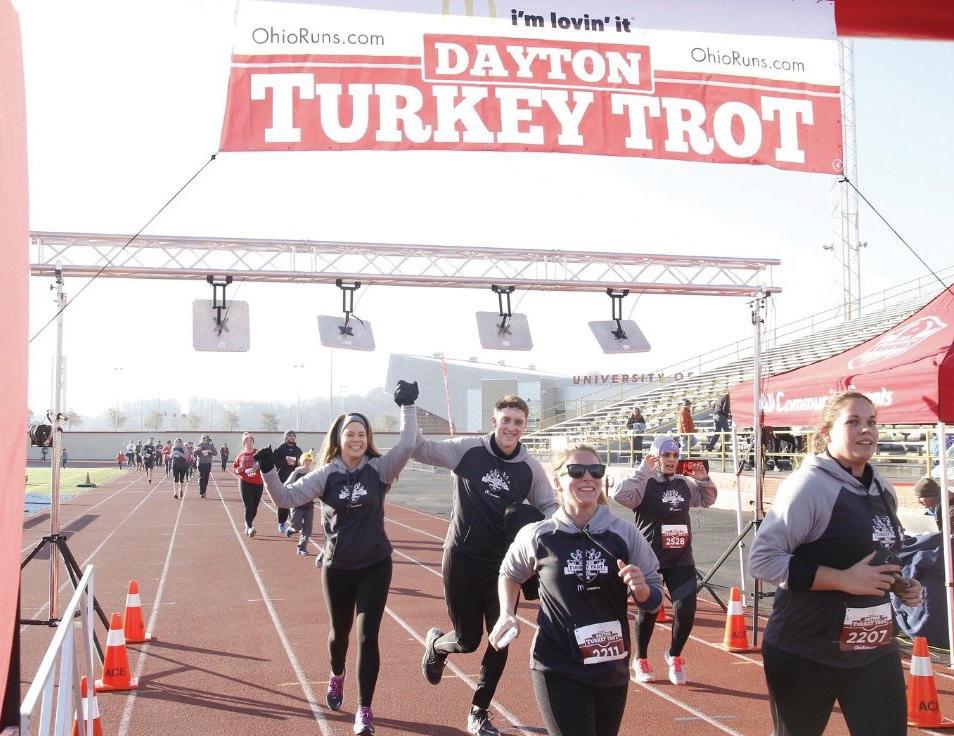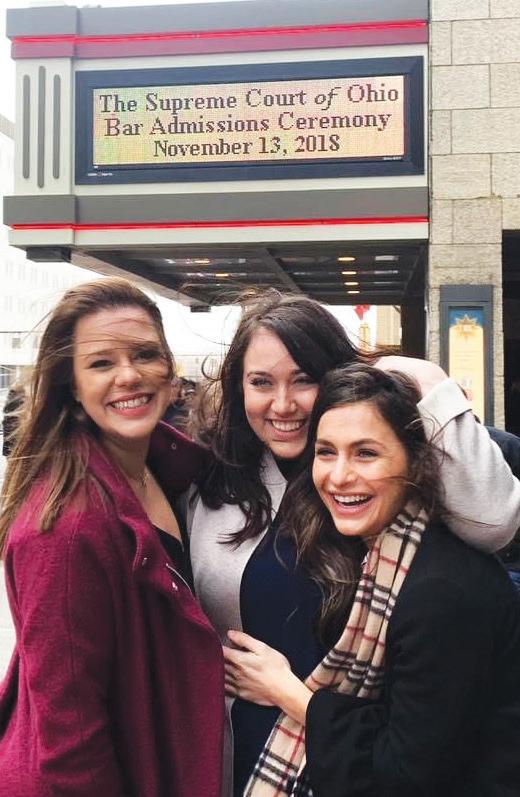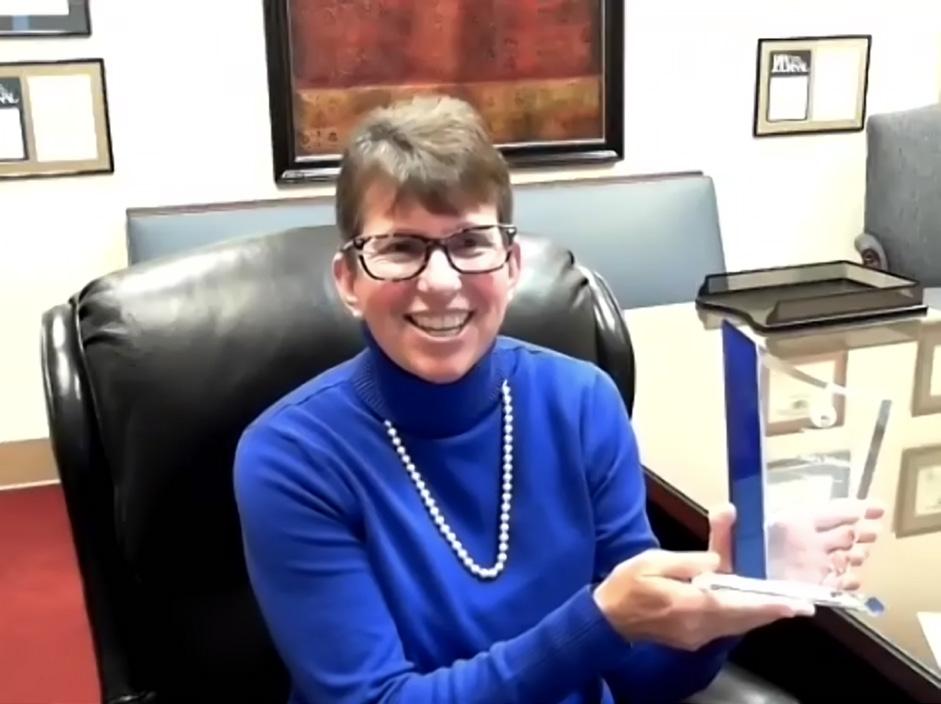
14 minute read
DBA RISING STAR: SHAWNA SORRELL ESQ


Advertisement

Shawna Sorrell Esq. Taft Law
One of the greatest skills that an attorney can develop is empathy. Without the ability to understand and share the feelings of others, an attorney is limited in his or her ability to properly service clients and the community at large. This month’s Rising Star of the Bar is an up-and-coming attorney who credits empathy as the driving factor in her success: Shawna Sorrell.
Shawna was born in Middletown, Ohio, but moved around quite a bit. During her childhood, substance abuse and addiction issues were prevalent in her home, and she was eventually placed in foster care for a brief period. She lived in Tennessee and Colorado, but moved back to the Dayton area, where she attended Carlisle High School, and later the Miami Valley Career Technology Center where she studied legal assisting during her junior and senior year of high school. Upon graduation, she enrolled at Wright State University. At Wright State, Shawna studied psychology, and worked part time as a legal assistant for David Chicarelli and Dan Allnutt. During this time, Shawna gained exposure to personal injury, family, and criminal law. But fundamentally, Shawna gained understanding of the valuable role that support staff serves in the legal practice. While working part time, shared by two attorneys, when “everything is an emergency,” Shawna learned how to prioritize and understand the urgency in which clients rely upon lawyers to help solve their problems. Frequently, she took these observations into her psychology classes and would appreciate the connections she made between the theoretical concepts discussed in the classroom, and the practice skills she developed in the real world.
In addition to pursuing her undergraduate degree and working part time as a legal assistant, Shawna took on jobs as a server at Cracker Barrel and later Roosters, where she worked as a server and bartender. “Both jobs taught me the importance of patience,” Shawna remembered. “You see a lot of people who are unreasonable and demanding when you work in the service industry, and you have to develop patience and the ability to prioritize or you will get run over. It taught me how to juggle a lot of things at once while also showing people respect and decency.”
After college, Shawna enrolled at University of Dayton School of Law on an academic scholarship. She chose UDSL so that she could remain close to home and maintain the flexibility to visit and spend time with family. During her time at UDSL, Shawna quickly rose to the top of the class. She earned CALI awards in classes such as Legal Writing, earned a spot on the law review, and developed friendships that she trusts will endure. During her 1L summer, Shawna worked at Casper & Casper, where she gained deeper exposure to worker compensation and personal injury work. During her 2L summer, she worked as a law clerk with Taft Stettinius & Hollister, where she eventually accepted an offer to join as an associate attorney following graduation. Shawna credits her summer at Taft with solidifying her belief that the practice of law was a good fit for her. Shawna valued the firm’s diverse areas of practice, as well as its commitment to gender advancement, diversity, and inclusion. During her summer, Shawna had the opportunity to dabble in multiple practice areas, including corporate work, litigation, government contracting, and labor and employment.
After graduating near the top of her class, Shawna sat for the bar and learned during her Taft orientation that she was assigned to the Labor and Employment practice group. Shawna hit the ground running and developed a strong practice where she counsels clients on employee hiring and termination, employment agreements, personnel policies, harassment, discrimination, wage and hour issues, ADA, FMLA, and worker’s compensation. Shawna enjoys the policy development side of her work, because to her, it is like a puzzle in trying to not only fit the pieces together, but to do so in a way that can maintain the client’s workplace culture and values. Through this work, Shawna sees her life experiences and studies in psychology as invaluable: “When you work with a client that is dealing with a difficult employee
continued on page 19
or a workplace issue, having the life experience that I do and experience in the service industry where people live paycheck to paycheck really helps you understand the rationale behind why people make seemingly odd choices, and it also helps you to counsel your clients into how they can find an equitable resolution to avoid litigation.”
During her time with Taft, Shawna has learned the value of mentorship. She credits Jeff Mullins, Jennifer Hann Harrison, and Carolyn Davis as being monumental influences on how she approaches her practice. “Jeff, Jennifer, and Carolyn have taught me not only the substantive law, but also how to cultivate the attention to detail and practice considerations that are necessary for serving the client. I am lucky to have such great partners who always have their door open to bounce around ideas,” Shawna explained. “When new associates join the firm, I always make it a priority of mine to pay it forward and offer any advice and mentorship that I am able.”
In her spare time, Shawna serves on the associate boards for Big Brothers Big Sisters, and For Love of Children (“FLOC”). Shawna sought out opportunities to contribute to both organizations because of the meaning and impact they have in the community. Shawna recalls “I found FLOC first, because it was a mission that really resonated with me. Having grown up around substance abuse and addiction and being in foster care, I understand the difference people can make in the life of a child. My first interaction with an attorney was when I was in foster care. I was 13 years old and felt like no one ever listened to me because I was just a kid, which was incredibly frustrating when the adults in your life make erratic and irrational decisions, but he listened to me and I felt valued and heard.” Whether it is volunteering to stock Christmas gifts for underserved children, or contributing to FLOC’s “Blessings in a Bag” program where volunteers fill book bags on Friday’s with meals for children to enjoy over the weekend, Shawna is deeply attached to FLOC’s efforts to make our community a better place. Likewise, Shawna’s work with Big Brothers Big Sisters helps children realize their potential through fostering meaningful relationships with volunteers throughout the community. Shawna has invested countless hours raising money for Big Brothers Big Sisters and spreading its message and awareness. Through her efforts, more and more people have volunteered and engaged with the program to improve the lives of Dayton children.
Shawna understands that being a lawyer is more than just the services you perform for a client. Being a lawyer is about the role you have in the community to make it a better place. Shawna hopes that anyone who has experienced hardships in their childhood, or who are currently experiencing those
DBA RISING STAR: Shawna Sorrell Esq. continued from page 18
hardships, knows that they can rely on her and the rest of the supportive and inclusive Dayton community. With the help of others, it’s possible to overcome negative circumstances in order to secure the future that you want. Whether it is in her law practice or her contributions to organizations like FLOC and Big Brothers Big Sisters, Shawna has taken her life experiences and understanding of the human condition to improve her community. These qualities have made Shawna a great lawyer, and a well-deserving Rising Star of the Bar.
By Zachary S. Heck Esq. DBA Editorial Board Taft Law zheck@taftlaw.com | 937.228.2838
DAYTON Bar association
HERBERT M. EIKENBARY
Trust

Ad Index

Daily Court Reporter....................5 Eikenbary Trust..........................19 Ferneding Insurance..................23 LCNB Bank..................................9 NFP/Rogers McNay Insurance.......7 OBLIC.............................back cover R.L. Emmons & Associates...........12 Trisha M. Duff - Mediations...........5
WHAT Is THE EIKENBARY TRusT?
The late Herbert M. Eikenbary granted the bulk of his estate to fund Grants and Loans to lawyers under the age of 35 who practice/reside in Montgomery County. These Grants and Loans are to aid young, deserving lawyers who are in need of financial assistance.
Individual loans, are available up to $6,000 at 4% interest,
while grants up to $4,000 are also available.
To AppLY: Jennifer Otchy,DBA Chief Executive Officer Dayton Bar Association | 109 N. Main St., Suite 600 | Dayton, OH 45402-1129 jotchy@daybar.org | 937.222.7902 | www.daybar.org

When the COVID-19 pandemic picked up speed in the United States in March 2020, so many questions arose amongst employers and employees alike about how to protect the health of employees and the business of employers. A small sampling of the impact of COVID-19 on employment law matters is set forth below.
Families First Coronavirus Act
On March 18, 2020, the Families First Coronavirus Act (FFCRA) was signed into law. The FFCRA expanded the Family and Medical Leave Act (FMLA) temporarily to cover leave and loss of income for certain situations related to COVID-19. The FFCRA requires certain employers to provide employees with sick leave or expanded family and medical leave for specified reasons related to COVID-19. One of those reasons is when the employee is quarantined pursuant to federal, state, or local government order of advice of a health care provider), and/or experiencing COVID-19 symptoms and seeking a medical diagnosis. The other reason is when an employee is unable to work because of a bona fide need to care for an individual subject to quarantine, or to care for a child (under 18 years of age) whose school or child care provider is closed or unavailable for reasons related to COVID-19. If the employee is able to telework, he or she may not be eligible for leave under the FFCRA. The FFCRA applies to employers with 500 or fewer employees. The provisions apply from the effective date of April 1, 2020, through December 31, 2020. The FFCRA provides tax credits related to the mandated paid leave. Employers may require employees to follow reasonable notice procedures in order to continue receiving paid sick time.
The CARES Act
Congress passed the Coronavirus Aid, Relief, and Economic Security (CARES) Act ON March 27, 2020. It contains a myriad of provisions intended to infuse economic relief to individuals and businesses affected by the COVID-19 pandemic. Among the many provisions of the CARES Act was the enhancement and expansion of unemployment benefits to millions of employees throughout the country who were unemployed or underemployed because of the pandemic. It extended
By Gretchen M.Treherne Esq. Co-Chair, Labor & Employment Jackson Lewis P.C. Gretchen.Treherne@jacksonlewis.com | 937.949.3846
unemployment insurance by thirteen weeks and provides a four-month enhancement of benefits. It made unemployment compensation available for those who were not traditionally eligible for regular unemployment benefits, including those with a limited work history. The CARES Act provided an additional $600 per week payment to each recipient of unemployment insurance for up to four months, which expired on July 31. 2020. The extended benefits relating to the eligible number of weeks will end on or before December 31, 2020. There are calls on Congress to pass another stimulus bill with provisions similar to some of the now-expired CARES Act provision. As of November 1, 2020, no such bill has been passed.
The Lost Wage Assistance (LWA) Program, which was enacted on August 21, 2020, provided grants to participating states to deliver up to $400 per week to unemployment recipients to supplement their unemployment benefits for a certain period of time. Ohio was approved to distribute weekly $300 LWA payments to eligible individuals for the weeks ending August 1 through September 5, 2020.
OSHA Guidance
The Occupational Safety and Health Administration (OSHA) has provided Guidance for Preparing Workplaces for COVID-19 (OSHA 39990-03 2020), which can be found here: https://www.osha.gov/Publications/OSHA3990.pdf. According to OSHA, a COVID-19 outbreak may cause workplaces to experience absenteeism, change in patterns of commerce, and interrupted supply and delivery. It advises that every employer develop an infectious disease preparedness and response plan. The consideration for such plans may include: where, how, and to what sources of COVID-19 might workers be exposed; non-occupational
continued on page 21
LABOR & EMPLOYMENT LAW: The COVID-19 Pandemic Has Sparked Employment Law Issues continued from page 20
risk factors at home and in community settings; workers’ individual risk factors; and controls necessary to address those risks. Employers should plan for a potential reduced workforce due to absenteeism and the need for cross-training, social distancing, staggered work shifts, remote work, and other exposure-reducing measures. Employers should also implement basic infection prevention measures, workplace controls., and administrative controls.
Ohio Immunity Law
On September 14, 2020, House Bill 606 was signed into law in Ohio. It grants civil immunity from certain COVID-19 related civil actions for healthcare providers, businesses, schools, individuals, and other entities. Protection from suit is provided where the claim asserts that an injury, death, or loss to person or property was caused by either the exposure to or the transmission of COVID-19. Suit may only be brought, according to the bill, if it is established that the exposure, transmission, or contraction was by reckless conduct, intentional misconduct, or willful and wanton misconduct on the part of the person against whom the action was brought. The provisions of the statute apply retroactively from March 9, 2020, through September 30, 2021.
The bill does not mean that employers and business owners should ease efforts they are taking to stop the spread of the COVID-19 virus. It is still important to follow the guidance of federal, state, and agencies relating to health precautions. In addition, the state bill does not absolve employers of their obligations under federal law, including the Occupational Safety and Health Act.
Employment Litigation During the Pandemic
According to a report from Lex Machina, the number of new employment lawsuits filed in federal court dropped dramatically amid the COVID-19 pandemic. Employees filed approximately 2,500 less lawsuits in the first three quarters of 2020, compared to 2018 and 2019. The decline in harassment and discrimination cases may be tied to the shift of many jobs to remote. Another concern may be that certain businesses are suffering financially and may not have the financial means to pay settlements or judgments.
But, the pandemic has also brought has also resulted in certain lawsuits that would not have been brought but for issues that have arisen as a result of the pandemic. As of the end of the third quarter in 2020, employees have filed 309 pandemic-related cases, 200 of which came in the third quarter alone. The majority of the lawsuits include claims that employees were retaliated against for reasons related to the virus. FMLA and FLSA claims were also prevalent, as well as claims of disability discrimination. Of the federal court complaints, 19 were filed in Ohio federal district courts. As of November 1, 2020, 36 COVID-19 related employment lawsuits have been filed in Ohio state courts (most before the immunity statute was passed). As the COVID-19 pandemic rages on, it is important that we take measures to safely care for ourselves and the health of our employees, co-workers, clients, and customers. EDITORS NOTE: This article is for informational purposes and is not intended to constitute legal advice.
The Honorable Mary L. Wiseman Receives UDSL Alumni Award
By Ebony D. Davenport Esq., Chair DBA Editorial Board
On behalf of the entire DBA, the Bar Briefs Editorial Board is thrilled to announce that Immediate Past DBA President, Judge Mary Wiseman, is the 2020 recipient of the University of Dayton School of Law’s (“UDSL”) Hon. Walter H. Rice Honorary Alumni Award. The award is presented to an individual who is not a graduate of UDSL, but who represents the ideals and values of the school through exemplary achievement. Past recipients of the award include fellow DBA members: Dale Creech, Richard Perna, Merle Wilberding, Charles Faruki, Richard Saphire, Bruce Snyder, Helenka Marculewicz, and Neil Freund.


The award recognizes significant contributions to the legal profession, the community at large, and UDSL. Judge Wiseman has served on the bench of the Montgomery County Court of Common Pleas (General Division) since 2007 where she also serves as the court’s Technology Committee Chair. Prior to her appointment to the bench, Judge Wiseman practiced complex civil litigation in state and federal courts nationwide. In the past, she has taught courses at UDSL and Sinclair Community College sharing her knowledge and wealth of experience with aspiring legal professionals. Judge Wiseman also served as a City Commissioner for the City of Dayton from 1998-2002 demonstrating her longstanding commitment to civic engagement and public service.

Judge Wiseman has maintained her focus on community engagement through her various advisory and board commitments. She has served on the Ohio Supreme Court Advisory Committee on Interpreter Services, the Greater Dayton Volunteer Lawyer’s Project, Legal Aid of Western Ohio/Advocates for Basic Legal Equality, the National Conference for Community & Justice of Greater Dayton, and The Entrepreneur’s Center of Dayton.
As President of the DBA, Judge Wiseman brought her years of experience to help propel the DBA forward and make the Dayton legal community more accessible for all. We are proud of Judge Wiseman’s continued achievements and wish her continued success in all of her endeavors.

